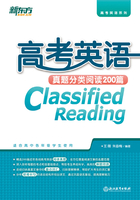
Passage 52
(2005 湖南 D)
Sir, I was halfway through Professor Raj Persaud's article “What's the tipping point”(Financial Times Weekend, april 9—l0)when it occurred to me that what I was reading was not ironic(讽刺的).If Prof Persaud wants to know why americans tip in restaurants, he needs only ask the first american he meets in London.
americans tip in restaurants for one reason, and one reason only: we tip to supplement (补贴)the salary of restaurant workers.Quality of service does not enter into it, beyond the fact that one may tip a bit less for poor service, or a little more for good service.
Not tipping at all in a non-fast-food restaurant is not a choice.In the U.S., one used to tip about 15 per cent for dining in a family-style restaurant or in an up-market (高档的)restaurant.Here, in San Francisco bay area restaurants, we are encouraged to tip 20 per cent or more, to help restaurant workers live in this very expensive area.
after eating at an Italian restaurant in my city, I left a tip of 20 per cent on the non-tax part of our dinner bill.It was expected. There is nothing more complicated (复杂的)than that about americans tipping in restaurants.
Ward Hoffman,
Palo alto, ca 94306, U.S.
* * *
Sir, I agree with most of Raj Persaud's opinion about the doubtful value of tipping, but with one exception(例外).Tips can be very useful when one is a repeat customer or diner.
It is only when the tipper is a stranger and likely to remain so that the system does not work to his or her advantage.but frequent a hotel or a restaurant, always tip a bit more, and the difference in service and treatment will be easily felt.
Philip Mc bride Johnson,
Great Falls, Va 22066, U.S.
1.What can we learn from Hoffman's letter?
A. Quality of service determines tipping in the U.S.
B. americans don't tip in non fast-food restaurants.
C. Tipping in U.S.up-market restaurants is unnecessary.
D. How to tip in the United States is not complicated.
2.Johnson's letter shows ______.
A. a stranger in a restaurant is likely to tip a bit more
B. diners receive better service if they frequent a restaurant
C. repeat dinners may get good service if they tip a bit more
D. the tipping system works to the advantage of new customers
3.From tbe two letters, we can learn Professor Raj Persaud ______.
A. feels doubtful about the value of tipping
B. believes tipping improves quality of service
C. wants to ask Hoffman about tipping in the U.S.
D. thinks tipping a bit more enables one to get good service
4.The two letters most probably appears in a ______.
A. notice
B. handbook
C. book review
D. newspaper
【重点词汇】
halfway adv.半路地,在途中
occur to 想起,想到
tip n./v.(给)小费
enter into 进入,参加,成为……的一部分;分享
fast-food restaurant 快餐店
doubtful adj.不确定的,可疑的
diner n.用餐者
【疑难长句】
1.I was halfway through Professor Raj Persaud's article “What's the tipping point ”(Financial Times Weekend, april 9—10)when it occurred to me that what I was reading was not ironic.
(参考译文)我在读Raj Persaud教授的文章 “What's the tipping point”(《金融时报》周末版 4月9日—10日),读到了一半的时候,才意识到我所读的文章并非讽刺。
2.If Prof Persaud wants to know why americans tip in restaurants, he needs only ask the first american he meets in London.
(参考译文)如果Raj Persaud教授想知道为什么美国人在餐馆付小费,他只需问一下在伦敦看到的第一个美国人即可(即任何一个美国人都可以回答这个问题)。